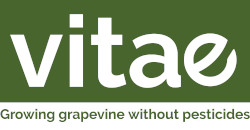Removing pesticides requires integrating multiple management options, usually with partial effects, and a shift from a curative approach to an agro-ecological approach based on prevention and improved agrosystems resistance. To do so, research must provide knowledge about agrosystem functioning in order to identify new credible approaches and improve the effectiveness of methods currently available (technical innovations). Identifying the most effective combinations of management options and the critical paths towards pesticide-free systems is also needed.
Through an interdisciplinary approach integrating the achievements of biology, agroecology, oenology, and economic sciences, VITAE addresses research fronts that have not yet been sufficiently explored, while questioning the extent of the social changes needed to promote this agroecological revolution.
VITAE investigates the development of biocontrol and the use of vine genetic resistance, an essential management option to wipe out pesticides from viticulture. VITAE investigates the development of biocontrol and the use of vine genetic resistance, an essential management option to wipe out pesticides from viticulture.VITAE addresses up-scaling issues and examines the drivers of agroecoogical transition. The project will generate scenarios for wiping out pesticides at the level of sectors and territories through interactive and interdisciplinary workshops.
Coordination: François Delmotte, SAVE Research Unit, INRAE ; Hervé Hannin, MOISA Research Unit, L'Institut Agro Montpellier ; Marielle Adrian, University Institute of Vine and Wine - Jules Guyot (IUVV), University of Bourgogne

